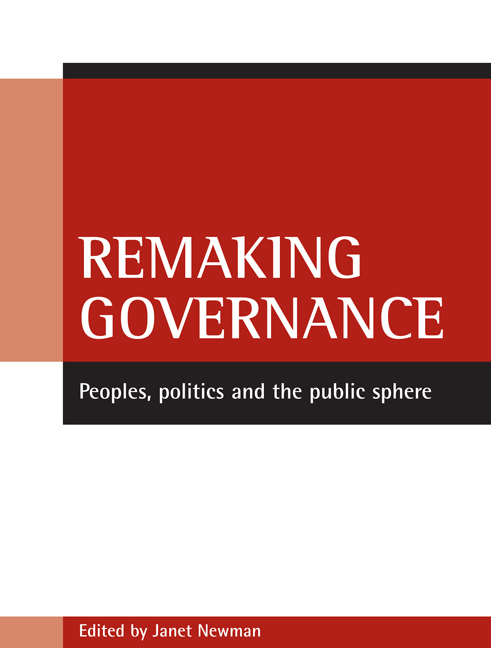Book contents
- Frontmatter
- Contents
- List of tables and figures
- Acknowledgements
- Notes on contributors
- Introduction
- one Reconstituting Europe: governing a European people?
- two Governance and the constitution of a European social
- three Remaking European governance: transition, accession and integration
- four Regendering governance
- five Welfare governance and the remaking of citizenship
- six Participative governance and the remaking of the public sphere
- seven Promoting democratic governance through partnerships?
- eight Among everyday makers and expert citizens
- nine Governance and the transformation of political representation
- Conclusion
- Index
nine - Governance and the transformation of political representation
Published online by Cambridge University Press: 18 January 2022
- Frontmatter
- Contents
- List of tables and figures
- Acknowledgements
- Notes on contributors
- Introduction
- one Reconstituting Europe: governing a European people?
- two Governance and the constitution of a European social
- three Remaking European governance: transition, accession and integration
- four Regendering governance
- five Welfare governance and the remaking of citizenship
- six Participative governance and the remaking of the public sphere
- seven Promoting democratic governance through partnerships?
- eight Among everyday makers and expert citizens
- nine Governance and the transformation of political representation
- Conclusion
- Index
Summary
Introduction
As Janet Newman points out in the Introduction to this volume, the shift in styles of politics in western countries from the more formal and hierarchical to the more informal and network-based – from government to governance – brings with it the need to question many of our received assumptions about politics and the state. This chapter sketches some of the traces of new kinds of political imaginary which change the meaning of political representation. Rules and practices of representation are fundamental to democratic politics. The legitimacy of policies and actors primarily rests on the extent to which they legitimately represent, or can successfully claim to represent, some group or larger set of social interests. The shifts in styles of governance from state-centric and more formal modes to plural and often informal modes of engagement with citizens at local, national and supranational levels raise important new questions about the scope and legitimacy of traditional notions of political representation. In the spaces of public– private partnerships, stakeholder involvement and new, more direct forms of citizen engagement, is there a transformed notion of political representation emerging? Can more groups, people and styles of activity count as ‘representative’ and, if so, what does this mean for the way in which we understand the term and more broadly for the legitimating role that representation plays in democracy?
The chapter will proceed as follows. First, it will critically appraise conventional approaches to political representation, suggesting in particular that they have ignored the process of constituting the represented which is so critical to political practice. In this sense, conventional approaches have overlooked the aesthetic and cultural aspects of representation, and the ways in which these are them-selves deeply political. Second, accepting the constitutive role of representative practices for the sense of identity that political actors bring to the political process adds impetus to the need to look at a range of wouldbe representatives beyond the conventional electoral arena. What claims can appointed local or other officials, local activists or participants in public–private partnerships make to be representative, and how might we appraise and evaluate them?
Finally, this takes us to the heart of the challenge that modern governance poses for political representation.
- Type
- Chapter
- Information
- Remaking GovernancePeoples, Politics and the Public Sphere, pp. 179 - 196Publisher: Bristol University PressPrint publication year: 2005
- 2
- Cited by



